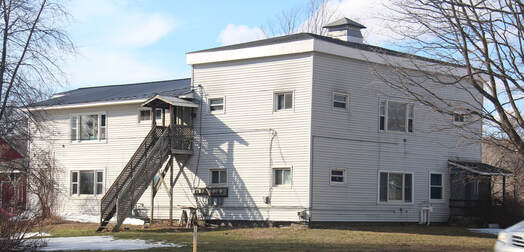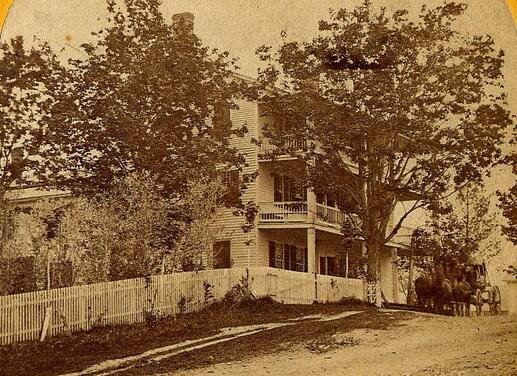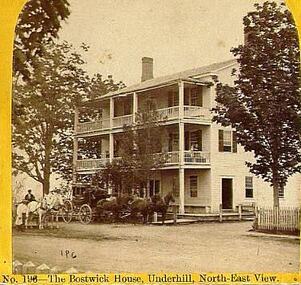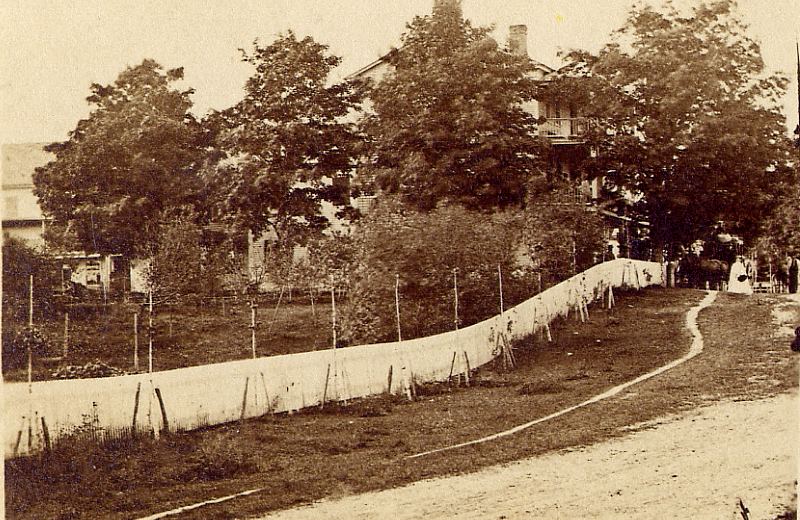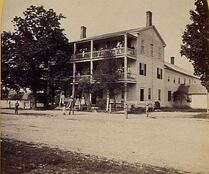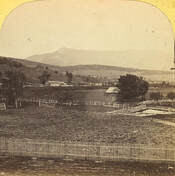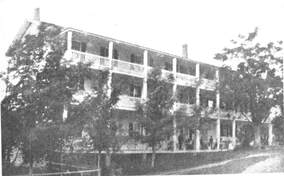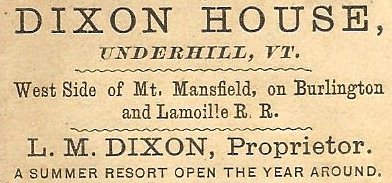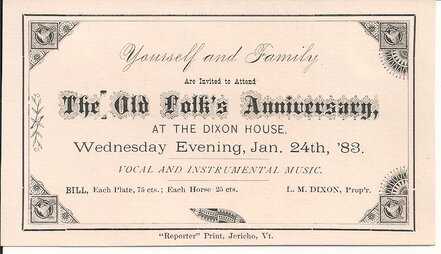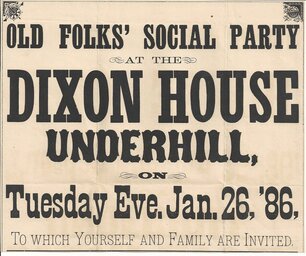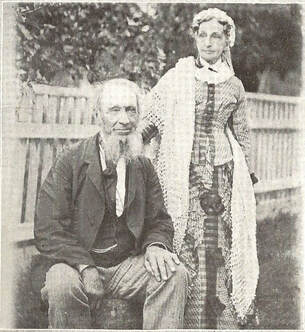 Leonard & Eliza Dixon
Leonard & Eliza Dixon
“On the evening of the 12th inst., the Richmond Band and Dramatic Club gave one of their best entertainments at this place. After excellent music by the band the drama entitled the ‘Maniac Lover’ in five scenes was played. The scenery representing each act was perfectly adapted to the play, and all the characters well personated. Especially ‘Michael Earl’ by C.W. Jacobs, ‘De Arville’ by E.T. Jacobs, Mary Woodward’ by Mrs. E.T. Jacobs. Mrs. Christian, Miss Jones, Messrs. Greens, Gleason and Jones, were all in their right places. The closing piece of ‘Turn Him Out’ was mirth provoking in the extreme. Mrs. Jacobs, Mrs. Christian and E.T. Jacobs brought down the house with laughter at their many hits. After the play was concluded a party of nearly one hundred returned to the Bostwick House and partook of one of Dixon’s best suppers. After supper Bryants band of Richmond was found among the guests and the remainder of the evening was spent in dancing. What contributed largely to the enjoyment of the occasion was the presence of three popular Chittenden county landlords, Love of the Richmond Hotel, Cooper of the Jonesville House, and mine host of the evening. What they could not do to entertain such a large party, others need not try. The whole affair was one of harmony and good feelings, and the dramatic entertainment at the church [either the Congregational Church in the Flats or the Methodist Church in Riverside, but which is not clear] was well received by a large and appreciative audience.”
Another Landmark Gone. The Dixon House at Underhill in Ashes –
Loss $12,600, Insurance $8000“The pleasant hotel at Underhill Flats was discovered to be on fire on Sunday morning at 2 o’clock by persons residing in the vicinity. It had been closed for the winter and was unoccupied, but fires were put into the building on Saturday for the purpose of warming the house. When the fire was discovered the upper part of the ell was one sheet of flame and had made such headway it was soon a mass of smoldering ruins. The main body of the house was soon on fire, and the night being a still one and the building burning from the roof downward, it was three o’clock before the last walls were prostrate. Only one tall chimney remains standing in its stately height, as if silently protesting against such sad havoc and desolation. There was so little commotion that people residing almost within a stone’s throw of the hotel did not know of its destruction until morning. Some of the furniture on the two lower floors of the main building was saved. It is supposed that the fire caught from one of the chimneys in the ell. The building was insured by T.S. Peck of Burlington in several stock companies for $6,000, and the furniture for $2000.
“This hotel has been a pleasant resort for many from all parts of New England and it will be with regret that they learn of its loss. It was first known as the Bostwick House, being built by Arthur Bostwick about the year 1803. It was then an unpretentious two story building, but was afterward somewhat enlarged by him. Clark Bostwick of this village was the first child born within its walls. It afterward passed into the hands of Rufus Brown, a son-in-law of Mr. Bostwick, who still further enlarged it by building more sleeping rooms in the ell part. Nearly 25 years ago the property was purchased by L.M. Dixon and by him beautified and enlarged to the commodious house it has since been. Mr. Dixon proved to be an excellent landlord and under his supervision it was made a very attractive summer resort and was well patronized. About two years ago and after the death of Mr. Dixon, the hotel was purchased by Dr. A.F. Burdick, and by him had been newly painted, papered, carpeted and furnished throughout at an expense of several thousand dollars.
“In 1832 the barns of the hotel, which stood very nearly where the present ones are situated, were accidently set on fire by a candle and burned to the ground, the hotel itself barely escaping the same fate. “Perhaps some of the older residents may remember the sign which used to adorn the post in front of this old time hostelry. It was shield shaped and was painted by a man from Burlington named Wicker. The work was done in the north room over the barroom and the landscape he painted thereon was from the natural scenery of hill, wood and dale, which the painter could see from the hotel window. On this sign was painted “Bostwick House” in large gilt letters. The other side was adorned with a two wheeled chariot, drawn by fiery steeds driven by a woman. A man by the name of Burroughs first drove a stage through this section from Essex Junction through Cambridge to Johnson, the mail having previously been carried by a man on horseback. Mr. Burroughs drove a very unassuming vehicle but about the year 1827 a man named Roswell Butler from Essex came on to the route with “nice yellow coaches” bought at Concord, N.H., and drawn by four horses, and for years the crack of the driver’s whip as he reined his fiery steeds driven at full gallop up the hill to the door of the Bostwick House, was a familiar sound. The railway mail system has obliterated the old time stage coach and to the regret of many, the insatiable element of fire has obliterated the pleasant resort for the traveller and the pleasure seeker – the Dixon House.”
![THE BOSTWICK HOUSE - photo c. 1868 [Click to Enlarge]](/uploads/2/7/5/8/27586889/editor/bostwick-house.jpg?1679669875)
